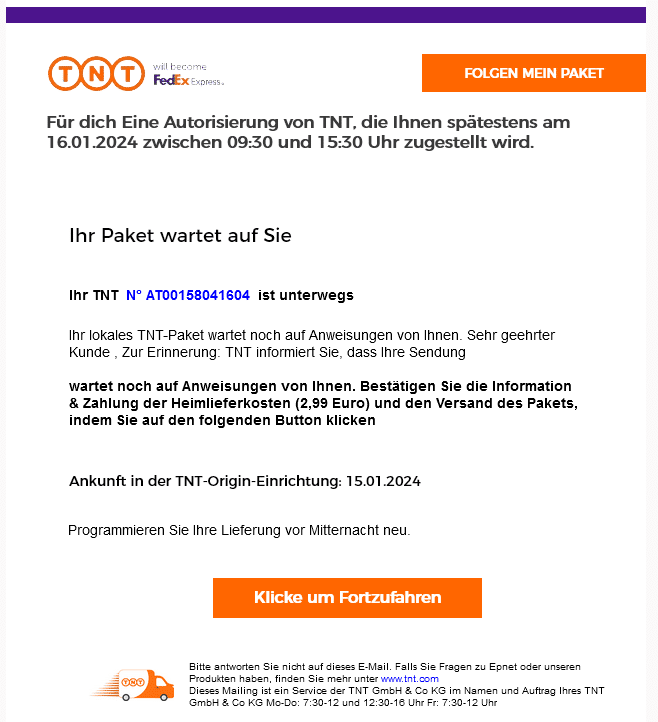The current wave of fraud targeting the TNT parcel service is a classic example of phishing attacks. These emails are designed to deceive recipients into disclosing sensitive information or transferring funds. The fraudsters pose as TNT and lure people with an alleged package delivery.

Identifying features of “TNT” scam emails
These emails often use convincing-looking templates that are similar to those of real courier companies. They typically contain a tracking code and claim that the package is awaiting further instructions or payment of delivery costs. They ask recipients to click a link to confirm or reprogram delivery. However, such links often lead to fake websites that aim to steal personal or payment information.
What you should do if you receive such emails
- Verify the sender: Real emails from TNT or other parcel services are sent from an official email address. Be wary of email addresses that don't match the company or look strange.
- Don't click on suspicious links: If you have doubts about the authenticity of an email, don't click on links or open attachments. Do not enter any personal or payment information.
- Contact the parcel service directly: If you are unsure, you should contact the parcel service's customer service directly. To do this, use the official contact information from their website.
- Learn about phishing methods: Stay up to date on the latest phishing tactics to better protect yourself.
What to do in case of fraud?
If you have fallen victim to such fraud, you should contact your bank immediately to stop or reverse any transactions. Also report the fraud to the relevant authorities and TNT so that they can take appropriate action.
Conclusion
This fake TNT email scam is an alarming example of how cybercriminals abuse well-known brands to gain trust and trick victims. It's important to stay vigilant, review suspicious emails critically, and stay informed about current scam tactics.
Questions and answers:
Question 1: How can I tell if a TNT email is genuine?
Answer 1: Check the sender of the email, look for spelling errors and unusual wording, and be careful with links and attachments. Genuine emails from TNT should come from an official email address.
Question 2: What should I do if I clicked the link in a suspicious email?
Answer 2: Change your passwords immediately, especially if you use the same credentials for other services. Monitor your bank accounts for unusual activity and inform your bank and the parcel delivery company. It may also be useful to run a virus scan on your device.
Question 3: How can I generally protect myself against phishing attacks?
Answer 3: Use strong, unique passwords for each online service, enable two-factor authentication where possible, and be wary of unexpected emails requesting personal information or payments. Stay informed about common phishing methods.
Question 4: Should I report phishing attempts?
Answer 4: Yes, it is important to report phishing attempts. Not only does this help warn other people, but it also allows authorities and companies to take action against the scammers. You can usually report phishing emails directly to the abused service provider as well as to the relevant government authorities.
Question 5: Are only large companies like TNT targeted by such scams?
Answer 5: No, cybercriminals target a wide range of businesses, including small and medium-sized businesses. Anyone with an online presence can be the target of a phishing attack.
Phishing attacks are constantly evolving, and fraudsters are finding increasingly sophisticated ways to get your data. It is therefore essential to remain vigilant and aware of the latest security threats. Remember that your safety is often in your own hands. By acting carefully and taking a critical attitude towards suspicious emails, you can protect yourself and your data.
We recommend that you sign up for the Mimikama newsletter under Newsletter and attend our online lectures and workshops, which you can find under Workshops . Stay informed and safe online!
Also read:
Notes:
1) This content reflects the current state of affairs at the time of publication. The reproduction of individual images, screenshots, embeds or video sequences serves to discuss the topic. 2) Individual contributions were created through the use of machine assistance and were carefully checked by the Mimikama editorial team before publication. ( Reason )

